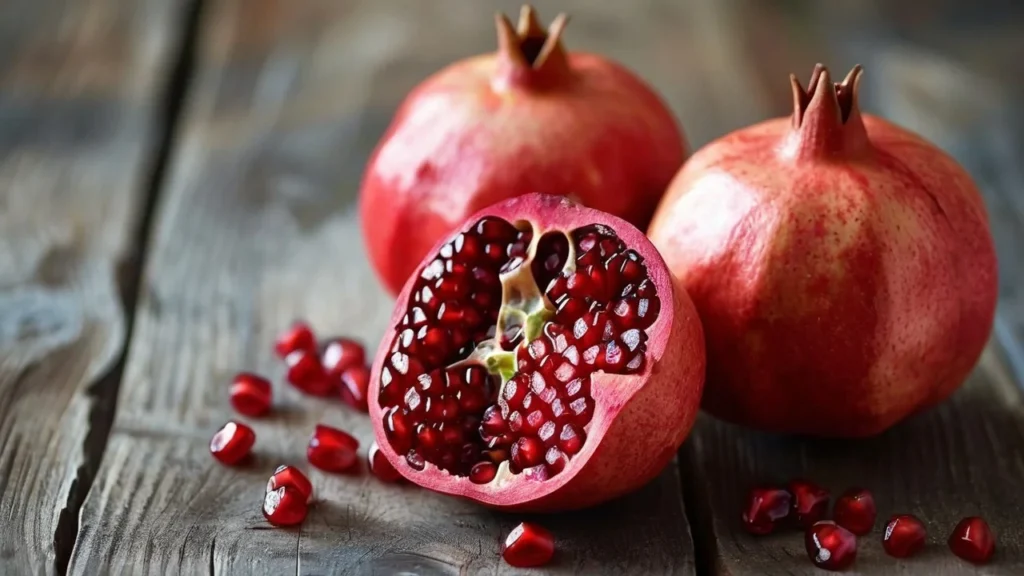Pomegranates: The Nutrient-Packed Superfood for Heart Health and More
Key Takeaways:
- Pomegranates are rich in antioxidants, fiber, and vitamins.
- They offer heart-protective benefits, support digestion, and may have anti-cancer properties.
- Pomegranates can be consumed fresh, juiced, or added to various dishes for a nutritional boost.

Nutritional Profile of Pomegranates
Pomegranates are packed with nutrients and are known for their powerful antioxidant properties. Here’s a breakdown of the nutritional content of one medium pomegranate (about 282 grams):
| Nutrient | Amount |
|---|---|
| Calories | 234 kcal |
| Carbohydrates | 52 grams |
| Sugars | 38.6 grams |
| Protein | 4.7 grams |
| Fat | 3.3 grams |
| Dietary Fiber | 11.3 grams (45% DV) |
| Vitamin C | 28 mg (48% DV) |
| Vitamin K | 46.2 mcg (58% DV) |
| Potassium | 666 mg (19% DV) |
High in Antioxidants
Pomegranates are one of the richest sources of antioxidants, especially punicalagins and anthocyanins, which protect cells from oxidative stress and inflammation.
Rich in Dietary Fiber
With over 11 grams of fiber per pomegranate, this fruit promotes healthy digestion, helps prevent constipation, and supports overall gut health.
Health Benefits of Pomegranates
1. Supports Heart Health
Pomegranates are well-known for their cardiovascular benefits. The antioxidants, particularly punicalagins, help reduce inflammation in the arteries and improve blood circulation. Studies show that pomegranate juice may lower blood pressure and reduce the risk of heart disease.
2. Anti-Inflammatory Effects
Chronic inflammation is a major contributor to many diseases, including heart disease, cancer, and diabetes. Pomegranates contain powerful anti-inflammatory compounds that may help reduce inflammation and lower the risk of these conditions.
3. Potential Cancer Prevention
Some studies suggest that pomegranates may have anti-cancer properties, especially in preventing prostate, breast, and colon cancers. The antioxidants in pomegranates help protect cells from damage, while other compounds in the fruit may inhibit cancer cell growth.
4. Promotes Digestive Health
The high fiber content in pomegranates aids in digestion and promotes regular bowel movements. Fiber-rich foods like pomegranates support a healthy gut microbiome, which plays a role in overall well-being.
Types of Pomegranates
There are several varieties of pomegranates, each with unique characteristics. Here are some of the most common types:
| Type | Description |
|---|---|
| Wonderful Pomegranate | The most common variety, known for its sweet-tart taste and deep red seeds. |
| Angel Red Pomegranate | This variety has soft seeds and is slightly sweeter than the Wonderful. |
| Parfianka Pomegranate | Parfianka is known for its balance of sweetness and tartness, with juicy, flavorful seeds. |
| Eversweet Pomegranate | A sweeter variety with nearly seedless arils, making it easy to eat. |
Wonderful Pomegranate
This is the most widely available variety in the U.S. It has a robust sweet-tart flavor and is often used in juices and cooking.
Angel Red Pomegranate
With softer seeds and a sweeter taste, Angel Red is perfect for fresh consumption or garnishing salads and desserts.
How to Incorporate Pomegranates into Your Diet
Pomegranates are versatile and can be enjoyed in various ways. Here are some ideas on how to add them to your meals:
1. Eat Fresh Pomegranate Seeds
The simplest way to enjoy pomegranates is by eating the seeds (arils) directly. They make a refreshing snack or a delicious topping for yogurt, salads, or oatmeal.
2. Add to Smoothies
Blend pomegranate seeds or juice into smoothies for an antioxidant-packed drink. Pair them with berries, spinach, and a banana for a nutritious and vibrant smoothie.
3. Pomegranate Juice
Pomegranate juice is a refreshing beverage that’s rich in nutrients. You can drink it on its own or use it in sauces, marinades, and dressings.
4. Use as a Salad Topper
Sprinkle pomegranate seeds over salads for a burst of color and flavor. They pair well with ingredients like arugula, feta cheese, and walnuts.
Pomegranates and Skin Health
The antioxidants and vitamin C in pomegranates make them excellent for promoting skin health. They help neutralize free radicals, reducing the appearance of fine lines and wrinkles. Additionally, pomegranate extract is often used in skincare products for its anti-aging properties.
Collagen Production
Vitamin C is essential for collagen production, which keeps skin firm and youthful. Consuming pomegranates regularly can help improve skin elasticity and slow the aging process.
Pomegranate Juice: Concentrated Health Benefits
Pomegranate juice offers many of the same benefits as fresh pomegranates but in a more concentrated form. It’s particularly beneficial for heart health and reducing inflammation.
Heart Health Benefits
Regular consumption of pomegranate juice has been shown to lower blood pressure and improve cholesterol levels, reducing the risk of heart disease. The juice also helps improve blood flow, particularly in individuals with high blood pressure.
Antioxidant Powerhouse
Pomegranate juice is rich in antioxidants, which protect the body from oxidative stress and inflammation. It may also help reduce the buildup of plaque in the arteries.
Conclusion
Pomegranates are a superfood with a wide range of health benefits, from supporting heart health to aiding digestion and potentially lowering the risk of cancer. Whether eaten fresh, as juice, or in recipes, pomegranates are a delicious and nutritious addition to your diet. Packed with antioxidants, vitamins, and fiber, they help promote overall well-being and are particularly beneficial for heart health and skin.
FAQ
Q: How do you open and de-seed a pomegranate?
A: To open a pomegranate, cut off the top, score the sides, and break it open in a bowl of water. The seeds will sink while the rind floats, making it easy to collect the seeds.
Q: Is it safe to eat pomegranate seeds?
A: Yes, pomegranate seeds (arils) are completely edible and provide a good source of fiber, antioxidants, and vitamins.
Q: Can pomegranate juice interact with medications?
A: Pomegranate juice may interact with certain medications, such as blood thinners and ACE inhibitors. It’s best to consult with a healthcare provider if you’re taking these medications.
Q: Are pomegranates good for weight loss?
A: Pomegranates are low in calories and high in fiber, making them a great choice for those looking to manage their weight.










